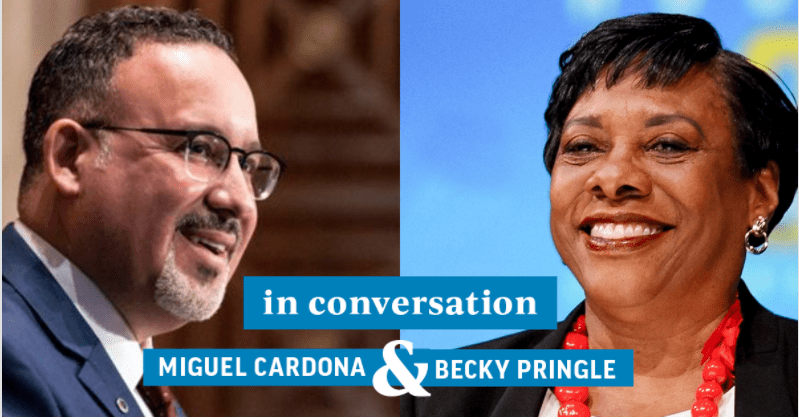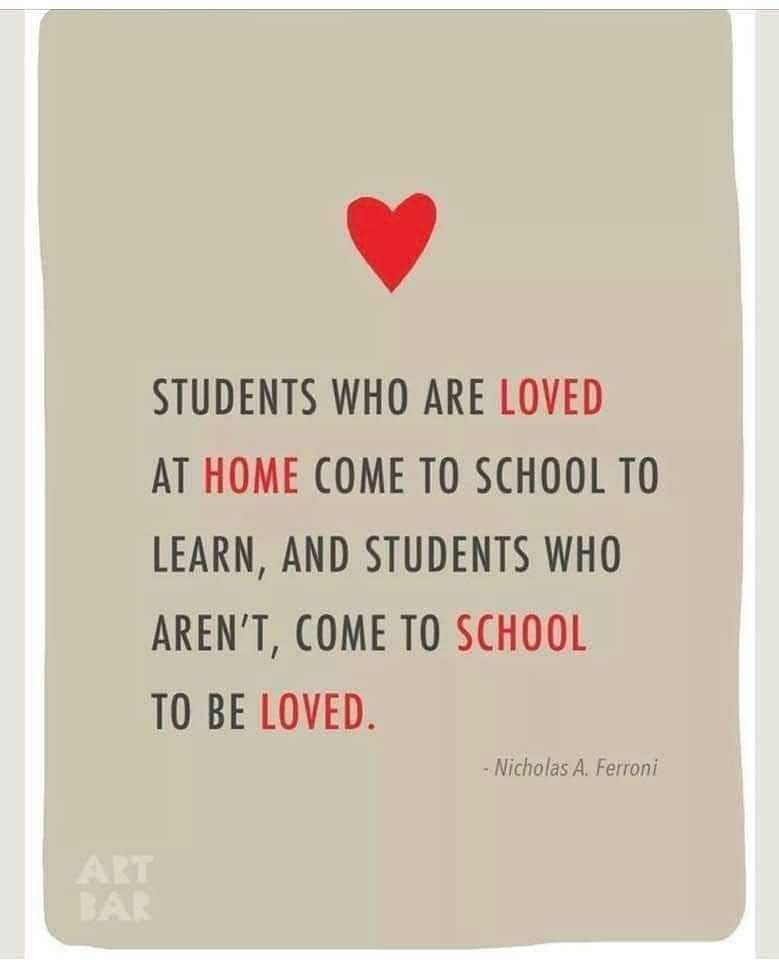
I am so hopeful that for the first time, that I can remember, our NEA
(National Education Association) will have a cooperative relationship with the Secretary of Education…What a difference for our children and public schools will this make!!! This is historical…Such an opportunity!!!
NEA President Becky Pringle sat down (virtually) with U.S. Secretary of Education Miguel Cardona and hundreds of NEA members to learn about the department’s priorities during the pandemic and beyond…
Pringle thanked Cardona and President Joe Biden’s administration for honoring “the promises made to get control of the pandemic, to make investments in public education, to listen to educators, and to lead on racial and social justice.”
Cardona then expressed appreciation for educators’ heroic and unyielding work during the pandemic, saying more people than ever now recognize that community and state growth starts with good education: “I want to thank you for your commitment and for everything you’ve done,” he said.
Cardona stated that he will focus on closing the digital divide and homework gap; getting all of our students back into classrooms as quickly and safely as possible; creating equitable access to college and career programs; and making higher education affordable..
As his department begins to address these issues, Cardona said he will partner with NEA every step of the way as we “learn together, grow together, and heal together.” But we must not lose the sense of urgency of the pandemic, he cautioned…
“Our kids need us now more than ever. … We now have the opportunity to hit reset on things that don’t work, and I am committed to making sure we have NEA at the table to [elevate the profession] and do the very best for our students.”
NEA members submitted thousands of questions for Secretary Cardona. The following are some highlights of the hourlong town hall, with questions and responses edited for brevity…
Key Takeaways
Cardona’s priorities: closing the digital divide and homework gap; getting all of our students back into classrooms as quickly and safely as possible; creating equitable access to college and career programs; and making higher education affordable.
The Department of Education will work with NEA and educators to guide decisions on assessments…
Educators and unions will be part of the planning process in how American Rescue Plan funds are used to best serve students…
Question:
Can you share with us how you envision the future of assessments?..
Miguel Cardona: There is no “one-size-fits-all.” For example, assessing students who don’t understand English makes no sense. I get the frustration and the challenge that assessments present. No educator needs a standardized test to let them know how their students are doing. It’s just one data point. We need sensible assessments, always asking, why are we doing this? Does it improve instruction? Does it help serve students?
I’ve seen an overreliance on tests, and I’ve seen a harmful narrowing of curriculum. Assessments should mirror good instruction, and I’m eager to make sure they are authentic and assess students in a real way. I look forward to having NEA members at the table from the beginning to guide the work on assessments.
Now that the money from the American Rescue Plan (ARP) is going to the state and local schools, how are you working to ensure governors and local districts are using the funding to best help our students?
MC: We released an application for states to share what their plans are going to be and what they entail, and I want those plans to be public … to have educators’ fingerprints all over them…
We need to work with our educators and all stakeholders. We need ongoing collaboration. This is unprecedented, the amount of funds going to schools, and we need to be good stewards of that, which means bringing educators and all voices together.
We put out guidance (that includes the voices of NEA members) to make sure the money is going to support schools and not supplant funding that would have been there before.
I recognize that people are feeling burned or hurt or pushed aside. Through our actions more than our words, I want you to know that this is a new day, and I look forward to working with our educators. Our job is to help support you so can be successful in helping children…
Question:
Due to the pandemic, some students are behind academically. What will you do to help get students back on track?
MC: Many of our students were significantly affected academically. But to get to that piece, we first need to get to their social and emotional well-being. It’s hard to learn if you’re grieving, or if your teeth hurt, if you’re hungry, or if you’re not sure where you’re sleeping at night. The pandemic created a lot of these issues for our students and families…
After such a traumatic experience, let’s make sure that the social and emotional well-being of our students and educators guides the decisions we’re making. People talk about the “three R’s,” but the most important is the fourth R—relationships….
After we support that, we focus on accelerating learning inside the schoolhouse, outside the schoolhouse, after hours. That could be in nontraditional forms. We need to be creative about that…
Question:
What is your plan to serve students with special needs and to fulfill the promises made to them at the federal level?
MC: I want to make sure [those] I bring in to the agency share my belief that our students with disabilities are first students who need to access the general education curriculum. They should not be defined as students with disabilities—they are students with abilities. They are assets, and they bring so much to the table. We have to shift to that way of thinking.
We need to ensure they have access to quality, tier one education first, and then look to specializing instruction. We need to ensure there is funding for IDEA. Special education teachers’ caseloads are too high to help students grow. Our regular classroom teachers haven’t had sufficient professional learning to help these students, and there is a lot we can do…
What policies do you plan to put in place to support all educators as expert professionals?
MC: Hopefully after this pandemic, there’s a newfound appreciation for the amazing work educators do day in and day out
First, we must pay educators what they are worth. It’s unacceptable that, in 2021, educators have to work a second job because their first job doesn’t pay enough. We need to value growth opportunities and professional learning opportunities. We ask so much of our educator’s—blended learning, trauma-informed instruction—and I want to make sure that ARP resources have job-embedded professional learning opportunities. Not those offered from 4 to 8 p.m., or three times a year where we cram everything in. Let’s reimagine what professional learning means.
We also need good “grow-your-own” strategies. How can we more systematically make sure education support professionals and more people of color become certified teachers so they can grow in their careers….
Question:
How will you expand and ensure access to more student debt cancellation, particularly for Black, brown, and Indigenous students, and ensure that public service workers have a clear pathway to the loan forgiveness they were promised?
MC: We can’t expect that college students take on this massive debt and be weighed down for rest of their lives. It’s unacceptable, and there are some students that are disproportionately affected by this.
We have done some things to help borrowers most in need. For example, there is now relief—$1.3 billion—for those who have total or permanent disabilities. We will continue to look at ways to help other borrowers with the most need.
In 2017, when public service loan forgiveness loans became available, 98 percent of those who applied were rejected. We need to do better.
At the end of the conversation, Pringle told participants that it was the first in many conversations NEA will have with Secretary Cardona to discuss his experience in public schools, his vision for learning, and the Biden-Harris Administration’s priorities for our public schools and institutions of higher learning.
Watch a Recording of the Full Conversation with Miguel Cardona…




